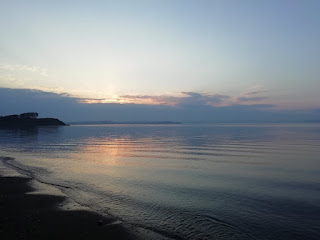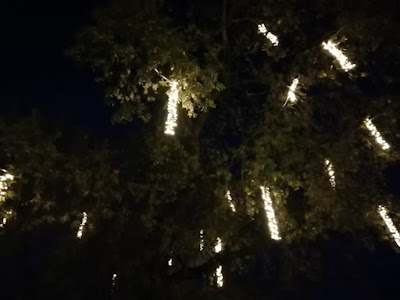Peter Kingsley and the forgetting of the Sacred
Peter Kingsley is a professor in philosophy at Cambridge. His research interest is the presocratic thinkers, first and foremost Empedocles and Parmenides. Something I love about Kingsley is that he is an acknowledged academic researcher from one of the highest ranked universities in the world, and at the same time he publishes books which are unacceptable in a scientific perspective. They probably have made him an outcast in the academic world. Kingsley is a mystic, and his perspectives are not rational, they represent a break with mainstream consensus culture, or what Kingsley calls ‘the myth of rationality’. His views may be seen as madness, but from Kingsley’s point of view, the mainstream normality is the madness.
His most
important book in recent years is Catafalque. Carl Jung and the end of humanity. It’s a dark book. Kingsley argues that western culture is dead, and because
western culture is so dominant in the world, this means the end of humanity.
Hence the title, a 'catafalque' is a stand for the coffin in a funeral. I imagine
this book as a framework for understanding the end of our world as we know it.
The main viewpoint
of the book is expressed in this quote: "Western civilization has come to
an end. The energy behind its momentum is over; spent. Anyone sensitive enough
to the depths can recognize this instinctively, physically, deep inside. But to
feel it needs a certain courage because the stillness at the end is
horrifying.(…) It’s the silence of everything you know coming to an end, just
like that. But of course to realize this consciously would be too big a shock.
And so what happens is that – like a wheel or a disk still spinning even after
it’s been switched off – people keep on rushing around because they don’t want
to realize anything has stopped. (…) We are simply being carried by the
ghostlike residue of that original movement which is nothing more, now, than
the momentum of our own unconscious habits." Catafalque p. 430.
Kingsley’s
thesis is that western culture is dying because we have failed to honour our
sacred source; that all life comes from and returns to the sacred. The sacred
is about connecting with nature and the eternal flow of life, and its about acknowledging
that we as humans are not in control of our lives. But Kingsley isn’t just another moral philosopher who is talking about ecological destruction, His point
of view is more radical: The secular, scientific-materialistic
worldview of western culture is actually based on divine revelations received by the presocratic
philosophers, who were mystics and prophets, conveying timeless, primordial and sacred knowledge. But we have forgotten our sacred roots and this has led to self-destruction.
In a fundamental
way this book is an argument for the urgent need of a new orientation: Mankind is in a
state of confusion, an old orientation has been lost, and a new one is needed. This
new orientation is a rejection of a reductionistic worldview, and a longing to
include the sacred, the divine, the magic in what is legitimate knowledge. This knowledge is hard to describe: “The timeless, primordial revelation which has existed
since eternity and which we cannot understand with the mind.” The point for
Kingsley seems to be that western culture needs to become aware of its
sacred origins, let go of the illusion that we are in control of our lives,
and start to listen to what wants to emerge through us.
This point of view reminds me of other rebels against mainstream culture through history. Like e.g. Martin Luther, the theologian, who protested against the beliefs of the church
which said that you could contribute to your salvation with your good deeds.
No, Luther said, the faith in God is a gift, salvation is a gift, life itself
is a gift which we receive in every single moment. Life is grace, and faith in God is
trusting that grace, knowing that we are dependent on a bigger force than ourselves. Luther was banned
by the pope, and another rebel, Giordano Bruno, was executed for pointing out something related, that
we are lived by forces bigger than ourselves: “There is one spirit in all things, and no body is
so small that it does not contain a part of the divine substance whereby it is
animated.”
Kingsley’s diagnosis
that western culture has forgotten the sacred, is not new. Max Weber named it
the disenchantment of western culture: A cultural situation where there is no
longer room for the transcendent, and what is real is understood as what can be empirically ascertained
and sensed. Thinkers
like Martin Heidegger, Peter Berger, Walter Benjamin and Knud Løgstrup have explored
the impact of this loss of transcendence, and the possibilities for opening up
to the reality of the sacred within the framework of an empirical reality.
I am not sure, however, Peter
Kingsley would feel resemblance with any of these thinkers. His position is
that of the prophet’s, who howls against the ignorance, hubris and inflation of his
culture. He isn’t defending any specific religion. In a way he hasn’t even a
message to us, because its like he feels its too late for any messages about the need for change. Its like Kingsley just wants our culture, and our ways of thinking and being, to
die with dignity, and then move into the new and unknown: “Its so new we can only even possibly start to
intuit it by going deep into the nothingness inside ourselves where we become
free from every pattern of thinking, every single thought form, any memory of
the way things have been along with any expectation or phantasy or noble ideal
or hope of how things should be – because that’s still the momentum of the old.
First comes the silent call to die totally into the stillness, so as to be able
to become part of what the new movement will be (…). Its only by shedding
everything, including ourselves, that we sow the seeds of the future.” Catafalque p. 443ff.




Comments
Post a Comment